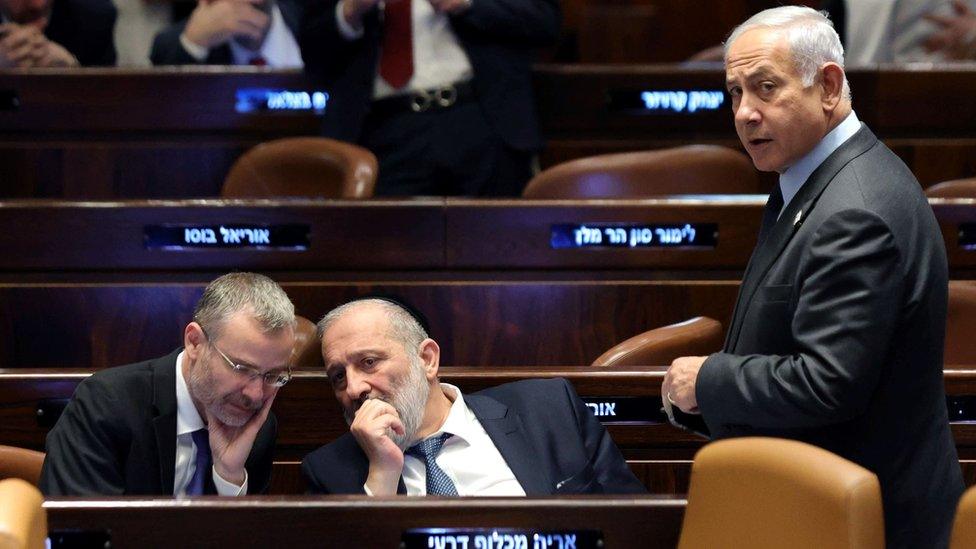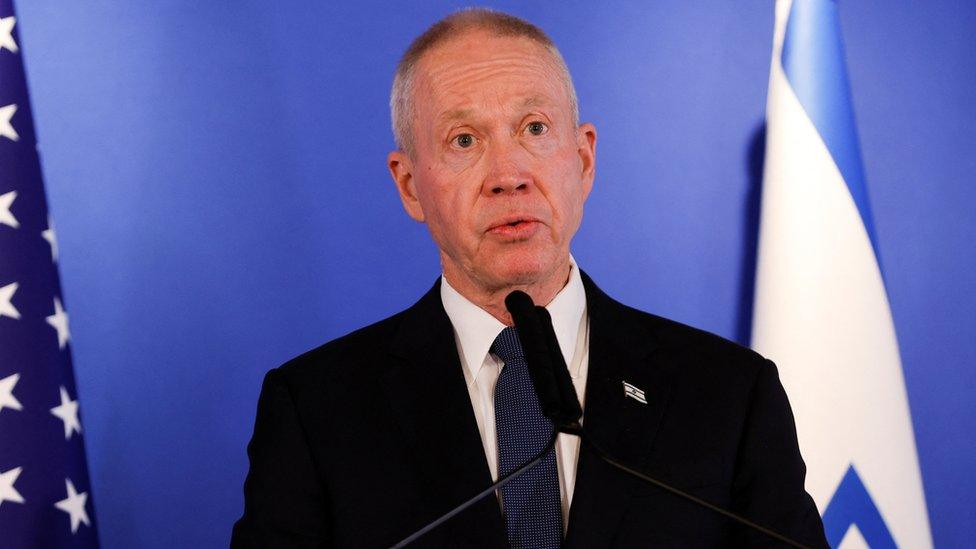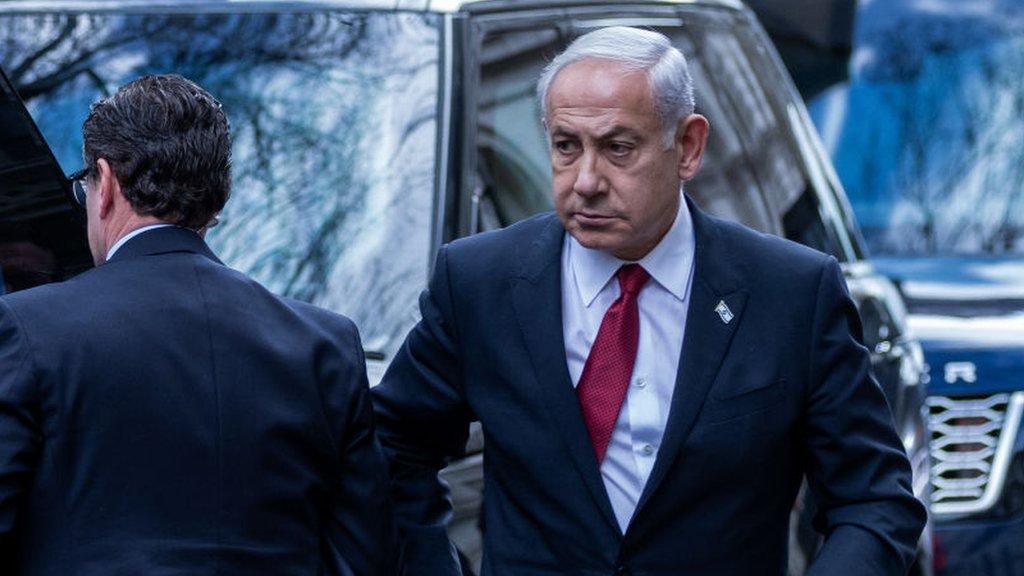Netanyahu rejects Biden's call to drop Israel judicial overhaul
- Published

Protesters gathered outside the president's residence on Tuesday as government and opposition negotiators held talks
Israeli Prime Minister Benjamin Netanyahu has reacted angrily to comments by the US president, who urged him to walk away from his controversial judicial reform plans.
"They cannot continue down this road," Joe Biden told reporters.
Mr Netanyahu later tweeted that Israel would make its own decisions, "not based on pressures from abroad".
It comes after protests this week brought Israel to a standstill, forcing him to pause the proposals.
The protests have intensified since Mr Netanyahu returned to power at the end of last year, leading the most right-wing, nationalist government in Israel's history and promising to curb the powers of the judiciary.
His plans would give the government full control over the committee which appoints judges and would ultimately strip the Supreme Court of crucial powers to strike down legislation that it saw as effectively unconstitutional.
Mr Netanyahu says they would stop the courts over-reaching their powers and that they were voted for by the public at the last election. But most legal scholars say they would effectively destroy the independence of the judiciary, while opposition figures describe them as an attempted "regime coup".
Tens of thousands of people protested across the country on Sunday and Monday, and the biggest trade union called a general strike, after the prime minister sacked Defence Minister Yoav Gallant for publicly urging a halt to the reforms.
Mr Netanyahu eventually bowed to the pressure and announced on Monday night that he was pausing the judicial changes until the next session of parliament to allow time for dialogue.
Representatives from the governing coalition and the two biggest opposition parties in parliament - Yesh Atid and National Unity - met for the first time at President Isaac Herzog's residence on Tuesday. Mr Herzog's office said their discussions on a framework for the talks "took place in a positive spirit".
The president also met representatives of the opposition United Arab List, Hadash-Taal and Labour parties on Wednesday.

Benjamin Netanyahu (R) said on Monday that he would "pause" the legislation to prevent a "rupture"
Speaking to reporters during a visit to North Carolina on Tuesday, external, Mr Biden urged the coalition to abandon the reforms.
"Like many strong supporters of Israel I'm very concerned, and I'm concerned that they get this straight," he said.
"Hopefully, the prime minister will act in a way that he can try to work out some genuine compromise, but that remains to be seen."
The Israeli prime minister, clearly angered, took to Twitter late at night in response, external, writing: "Israel is a sovereign country which makes its decisions by the will of its people and not based on pressures from abroad, including from the best of friends."
He stressed that his coalition was "committed to strengthening democracy by restoring the proper balance between the three branches of government, which we are striving to achieve via a broad consensus".
National Unity party leader Benny Gantz said Mr Biden had sent the Israeli government an "urgent wake-up call".
"Damage to our ties with the US, our closest friend and our most important ally, is a strategic blow," he tweeted.
Mr Biden said he was not interfering, but he seemed to brim with scepticism when he referred to Mr Netanyahu's apparent attempts now to reach a compromise over the plans.
Since become prime minister again Mr Netanyahu has yet to receive an invite to Washington, now being seen as a test of whether the White House is happy with him.
When he asked on Tuesday whether he planned to send an invitation soon, Mr Biden replied: "No, not in the near term."
The president is a strongly pro-Israel Democrat, but Mr Netanyahu has a chequered past with him due to the anger sparked in the Obama administration when the Israeli leader tried to derail the 2015 Iran nuclear deal.
During this week's crisis, Mr Netanyahu's government was reportedly bombarded by warnings from the Biden administration, external that he was imperilling Israel's reputation as the sole democracy in the region.
Mr Netanyahu will likely have used the pressure as a way to get his far-right coalition partners to agree to pause the judicial reforms - warning of a crisis in relations with the US - thereby lowering the price of demands from them.
The two leading ultranationalists in the coalition - Finance Minister Bezalel Smotrich and National Security Minister Itamar Ben-Gvir - both eventually fell in line with Mr Netanyahu after talks on Monday.
Mr Ben-Gvir said he agreed with the legislative pause in exchange for a promise from the prime minister to advance his plans for a "national guard" reporting to him directly and funded through part of a multi-billion dollar budget.
Opponents and police officials condemn the idea calling it a "private militia" that will reap "chaos". However, there is scepticism in the Israeli media about whether the plan will actually go ahead.
The Biden administration has spent weeks dialling up the pressure on Mr Netanyahu to seek compromise with opponents over the judicial reform plans.
Earlier this year, during a visit to Jerusalem, US Secretary of State Antony Blinken stood next to Mr Netanyahu in what amounted to a public dressing down, listing the administration's expectations for "democracy" and "shared values" by the Israeli government.
Related topics
- Published27 March 2023

- Published27 March 2023

- Published27 March 2023

- Published25 March 2023

- Published24 March 2023

- Published6 March 2023
